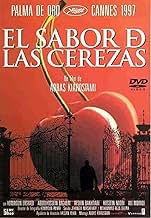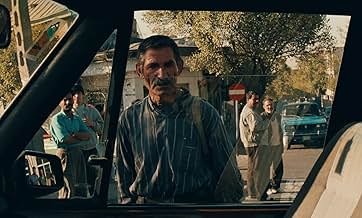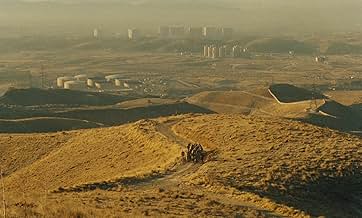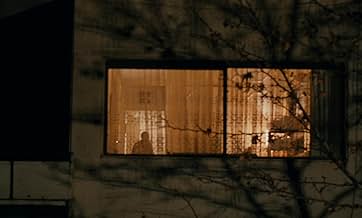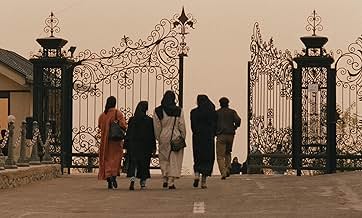Ein iranischer Mann fährt seinen Lastwagen auf der Suche nach jemandem, der ihn nach seinem Selbstmord still unter einem Kirschbaum begraben will.Ein iranischer Mann fährt seinen Lastwagen auf der Suche nach jemandem, der ihn nach seinem Selbstmord still unter einem Kirschbaum begraben will.Ein iranischer Mann fährt seinen Lastwagen auf der Suche nach jemandem, der ihn nach seinem Selbstmord still unter einem Kirschbaum begraben will.
- Regie
- Drehbuch
- Hauptbesetzung
- Auszeichnungen
- 3 Gewinne & 5 Nominierungen insgesamt
Empfohlene Bewertungen
There are critics who call this kind of untouched-by-art realism genius, who say that Kiarostami is making us think, reconsider the very nature of cinema, and so on. To my mind, the message of the film-- the taste of cherry makes life worth living-- is no more or less profound than, say, Woody Allen rattling off a few of the things that make life worth living in Manhattan, or the epiphany the kid in American Beauty gets from a plastic bag. (Likewise the message that it's all only a movie. Never woulda guessed.) And critics who find such a message shallow in a piece of slick entertainment, but deep when it's in a deliberately unentertaining art film, need to reexamine their critical principles, or lighten up a little-- or at least go see again the work of real art Kiarostami alludes to in his title, Wild Strawberries, which has more depth of characterization and emotional richness in any five minutes than this manages to scrounge up in an hour and a half.
I was afraid that if I ended the movie where Mr. Badie laid down on his grave the spectator would be left with a great deal of sadness. Even though I didn't think the scene was really that sad, I was afraid that it would come out as such. For that reason I decided to have the next episode where we have the camera running as Mr. Badie was walking around. I wanted to remind spectators that this was really a film and that they shouldn't think about this as a reality. They should not become involved emotionally. This is much like some of our grandmothers who told us stories, some with happy and some with sad endings. But they always at the end would have a Persian saying which went like this "but after all it is just a story! . . . The very last episode reminds me of the continuation of life, that life goes on, and here the audience is confronted with the reality they had hoped that Mr. Badie would be alive and there he is a part of nature and nature still continues and life goes on even without Mr. Badie. And if one could really think about being or not being present in life, or if one thinks about it in terms of the real implication of such presence, one might not in fact engage in committing suicide at all. The person committing suicide might think that s/he is taking revenge from the society, nature, life, powers to be, and so on. But s/he don't realize that after a suicide life still goes on and things stay the way they are. I could interpret this in a different way. If my audience is as creative as I imagine them to be, they can take this in a variety of interpretations and I can sit here and every time make a different interpretation of it, as every time one can creatively reinterpret the reality. "
From the beginning to the end, Kiarostami gives us a complex script of characters that we come into contact with, and as we learn about each one, we learn more about the idea of life. What makes the film very interesting for a Western viewer is that I find closer to Kiarostami's Iran after each of his films that I watch, and become more informed to it. We learn intimate details about the lives of several Iranians.
Throughout the film I found that, although like many of his films it was quite slow-paced, it contained the extraordinarily rich dialog that is expected of a Kiarostami film. His films advance through their rich dialog while using the dusty Iranian landscape as their backdrop. I found a lot of the cinematography to be terrific, viewing the city from a distance and looking into the dusty foot-hills on the outskirts of Tehran. It is more than poetic to see a man at the end of his rope searching through the dust and faces of Tehran's poor laborers for answers about life and death. In many ways, the film is a large metaphor for the human state of affairs.
The film culminates very well, and we all eventually find our own taste of cherry in the film. I always feel as if Kiarostami's films are a very philosophical experience, and are quite personal. In this sense, Kiarostami's films are amongst the best that I have seen.
However, they are undoubtedly slower paced than other films, and they require the viewer to detach himself from any western stereotypes that he has about film. This would not be a good film for somebody expecting action or a typical Western film, but rather, this would be a film that I would recommend only to those who are in the mood for an insightful, philosophical film that shows an alternative view of life. Overall, it was an emotionally powerful film that will stick out in my memory as all Kiarostami films do.
The pace is quite slow, and the director takes no pains to explain or clarify anything. We follow a man as he tries to enlist the help of ordinary people in carrying out a dark plan. The movie is about the interactions between humans, about the joy of life - the taste of a cherry - seen through the eyes of a desperate man. Not all the questions are answered, and not all the pieces of the puzzle are filled. I guarantee you'll discuss this movie for at least several hours after you see it.
Iran has a very young film industry that doesn't have the money or resources that many other film industries have. For what the Iranian film industry has at its disposal, this film is an exceptional achievement!
This film is a great example of how the expression of human beings' feelings and ideas cannot be held back by censorship. Kudos to Kiarostami for creating a very heartfelt commentary on the effects of oppression on the human soul.
Wusstest du schon
- WissenswertesThe film was shot without a proper script, relying on improvisations.
- PatzerIn the opening scene, as Mr. Badhi is driving past laborers looking for work, the same middle-aged white haired man, wearing a checkered sweater vest, is seen twice.
- Zitate
Mr. Bagheri: If you look at the four seasons, each season brings fruit. In summer, there's fruit, in autumn, too. Winter brings different fruit and spring, too. No mother can fill her fridge with such a variety of fruit for her children. No mother can do as much for her children as God does for His creatures. You want to refuse all that? You want to give it all up? You want to give up the taste of cherries?
- VerbindungenFeatured in Especial Cannes: 50 Anos de Festival (1997)
Top-Auswahl
- How long is Taste of Cherry?Powered by Alexa
Details
- Erscheinungsdatum
- Herkunftsländer
- Offizielle Standorte
- Sprachen
- Auch bekannt als
- El sabor de las cerezas
- Drehorte
- Produktionsfirmen
- Weitere beteiligte Unternehmen bei IMDbPro anzeigen
Box Office
- Weltweiter Bruttoertrag
- 12.187 $


